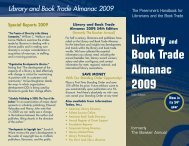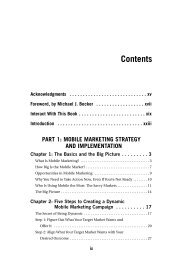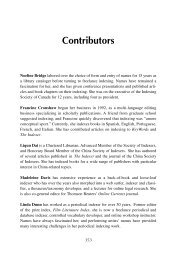Sample Chapter - Books
Sample Chapter - Books
Sample Chapter - Books
- No tags were found...
You also want an ePaper? Increase the reach of your titles
YUMPU automatically turns print PDFs into web optimized ePapers that Google loves.
Seven-Problem Approach to Indexing Names 9identifying a particular person, not causing the user to have to pause and wonderfor a second or two who is meant.Aristocratic names consisting of both a title and a family name pose the problemof whether to add the unmentioned one. This usually arises where aristocratsare known for personal achievements. The poet known as Byron, or Lord Byron,was the 6th Baron Byron. His first and family names were George Gordon Byron.For a book about his poetry, it would be appropriate to index him as “Byron,George Gordon, 6th Baron” only if the author and treatment require, or seem torequire, this full form. Otherwise, any of the following would be quite sufficient,depending on the wording in the text:Byron, George, LordByron, LordSee also White’s use of this example in <strong>Chapter</strong> 14.The aristocratic title can come later in life, after a person has achieved prominenceunder his or her own name. Both White and Griffith-Jones (<strong>Chapter</strong> 16)introduce the example of a British prime minister, Benjamin Disraeli, later elevatedto the aristocracy as the Earl of Beaconsfield. When he is referred to as Disraeli,which would be most of the time, there’s no need to add “Earl of Beaconsfield.” Hisfull handle would be appropriate only where his life as Earl of Beaconsfield istreated substantially or for a work concentrating on the collective earls ofBeaconsfield. Similarly, for a book about Margaret Thatcher’s political career, theaddition of “Baroness” would usually be unnecessary.In <strong>Chapter</strong> 15 on religious names, Mertes advises that, in general, the title “St.”need not be included in an entry unless the editor or author requests it, or it seemsparticularly appropriate. She then suggests four possible methods for adding it tothe name. Similarly, the title “pope” may be added for disambiguation, or wherereaders with less familiarity with religious names could benefit from this guidance.Dutch and German cataloging practice, as Pitchford’s <strong>Chapter</strong>s 4 and 6 explain,demonstrate minimalism with titles. White advises: “Most terms of address can beignored in the index.” In <strong>Chapter</strong> 16, Griffith-Jones provides examples of the correctuse of titles when they are to be added but states that full names plus titles areoften unnecessary. Context—or “it depends”—is pretty well everything here.Variant and changes of name raise the question of whether a person’s other, orformer or later, names should be added as a gloss to the heading. These names aredealt with later in the section “Variant Names Borne by One Person, IncludingChanges of Name,” but with regard to this particular section, it depends on whetherthese glosses are needed for clarity, as often happens with women with both marriedand birth surnames. For example, I used “Bennett, Myra (née Grimsley)”where a chapter in the book was devoted to Myra Bennett, who changed her name








